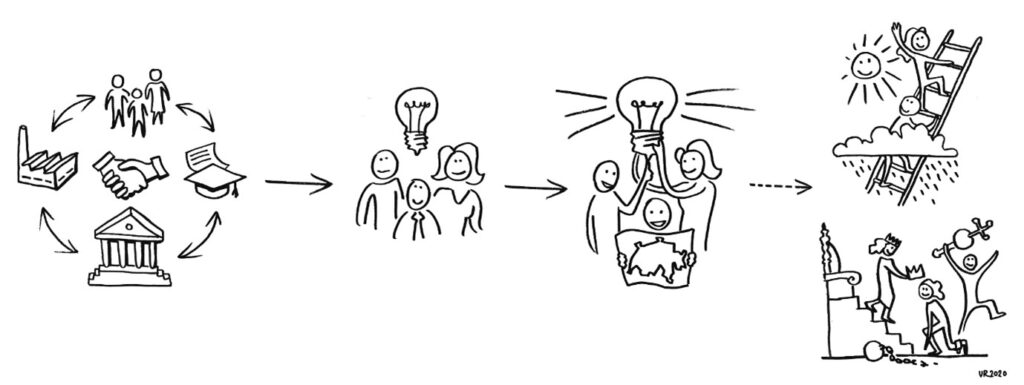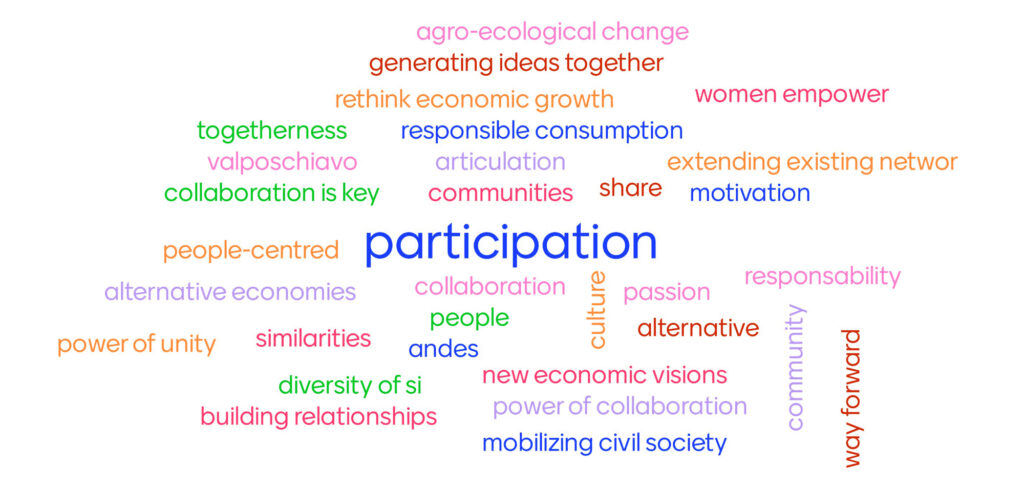Limited opportunities for economic development and related depopulation trends are a common challenge faced by many mountain communities worldwide. But mountain communities are also a fertile ground for social innovations and new ways of envisioning the future. In this online dialogue, speakers presented social innovations from Switzerland, Georgia, Nepal, and Ecuador, and offered recommendations on how to best promote such innovations for the benefit of mountain economies.
Social innovations happen when new collaborations and ideas emerge between individuals or organizations. These ideas may or may not be implemented. Social innovations can be beneficial to society, improving people’s quality of life and changing social or power relations, for example in regional development (definition based on Tschumi et al 2020: 118).
MRD authors Anna-Lena Stettler and Heike Mayer, the first a former master’s student and the second Professor of Economic Geography at the Institute of Geography and the Center for Regional Economic Development (CRED), University of Bern, Switzerland, introduced the concept of social innovations and presented their study of 100% Valposchiavo, a local initiative in a Swiss mountain valley that aims to close economic value chains, enhance cross-sectoral cooperation, and create added value for small- and medium-sized enterprises. Their study showed that the initiative has led to new social arrangements, increased collaboration, and augmented economic growth independence among small- and medium-sized enterprises in the valley (Stettler and Mayer 2023).

New collaborations between individuals and organizations can spark fresh ideas that may benefit society and lead to more equal power relations. (Graphic by Valentin Rüegg, 2020, courtesy of SNSF Project Social Innovation in Mountain Regions)
Promoting new social arrangements has also proven highly beneficial in a flood-prone area in Nepal. Abid Hussein, Senior Economist and Food Systems Specialist at the International Centre for Integrated Mountain Development (ICIMOD), Nepal, showed how creating informal women’s groups and supporting them through capacity-building and peer-to-peer learning has improved financial literacy and led to a more effective use of remittances among migrant-sending households. Ultimately, this innovation increased the households’ flood preparedness and decreased their overall vulnerability.
Social innovations develop and nurture competences and social cohesion among mountain communities, and this effect can be even greater when the innovation is linked to cultural and natural heritage. Ana Shanshiashvili, founder and Executive Director of the Georgian Heritage Crafts Association, highlighted the key role of the association of 300 members in strengthening the heritage craft sector. Making crafts using motives from local culture and nature offers new economic opportunities and creative approaches that empower mountain households, especially women. She also underlined how knowing the needs of local communities and creating ownership of the products was key to success in this Georgian initiative.
Social innovations are more likely to scale up and strengthen links between different social groups if they receive professional support. Stephen Sherwood, an organic grower and Rural Innovation Specialist at Fundación EkoRural, Ecuador, presented an initiative in Ecuador where rural producer organizations and urban food solidarity movements teamed up and, among other things, launched a challenge to establish responsible food consumption among 250,000 families. Participants organize cross-visits to farms, train students and volunteers to give demonstrations of critical food issues in parks, food courts, and buses, and share their activities on social media and a radio program. Drawing on synergies between the different actors, this collaboration has been crucial in scaling local food networks to a regional food solidarity movement. Stephen emphasized that policymaking should be seen as social process with formal and informal elements. He also underlined that emerging enterprises in the beginning often generate values other than economic ones, such as empowered individuals or social cohesion in communities.

Participants responded to the question “What inspired you most from what you heard in the presentations?” Answers highlight the importance of collaboration, participation, and communities.
MRD associate editor Sarah-Lan Mathez-Stiefel concluded the event by summarizing 3 key messages:
- In addition to contributing directly to local economies through the development of new products and livelihood opportunities, social innovations can generate important savings and help avoid costs, such as some of the costs related to poor health or flood response.
- Beyond generating economic benefits, social innovations also play a crucial role in building resilience among mountain communities, be it in terms of growth independence or adaptative capacity to shocks such as disasters or pandemics.
- Tapping into intangible social capital by promoting collaboration between different actors, mobilizing and empowering communities, and strengthening their cultural identity and natural heritage is key for social innovations to thrive.
Besides these important insights, the panelists in this MRD Talk offered a wealth of lessons and recommendations for policy and practice in their presentations. These important lessons—focused on how to best promote social innovations, including alternative economic pathways, for the benefit of mountain economies—can be accessed in the recording of the event and in the resources listed below.
Panelists
Moderators
Resources
MRD article discussed
Further resources
Sherwood S, Paredes M, Arce A. 2017. The vitality of everyday food. Farming Matters 33(1):43–46.
More MRD contents on this topic
Click here to view more articles









